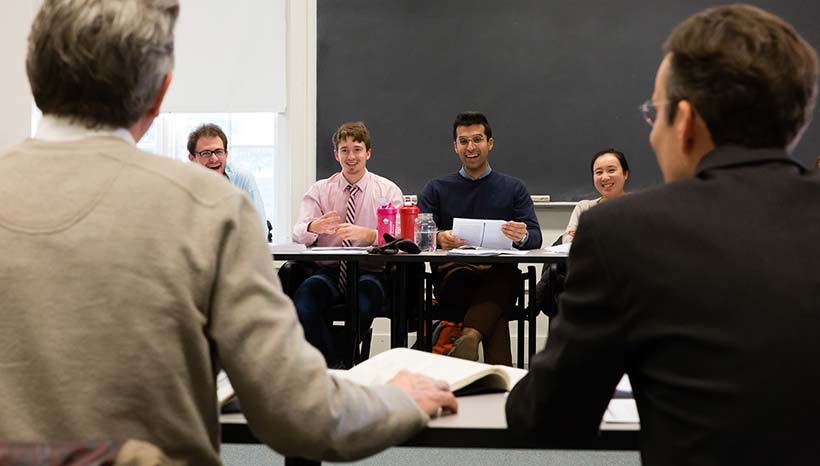
Law, Jurisprudence and Social Thought 355, Political Science 355: “Animals: Law, Ethics, Biopolitics”—Adam Sitze, associate professor of law, jurisprudence and social thought, and Thomas Dumm, the William H. Hastie Professor of Political Science.
In the final years of his life, Nasser Hussain—a beloved professor of LJST who studied and taught on emergency law, U.S. foreign policy and human rights abuses—began planning a research seminar on the legal status of animals.

When he died at age 50 in 2015, Adam Sitze, associate professor of law, jurisprudence and social thought, and Thomas Dumm, the William H. Hastie Professor of Political Science, did not want their colleague’s idea to “die a second death.” They decided to teach the course together.
The syllabus, designed mainly by Hussain and supplemented with works chosen by Dumm and Sitze, ranges widely. Students in the fall-semester class read and discussed commentary on the legal distinctions between people and property in ancient Rome, a volume on modern animal rights law, arguments by philosophers such as Peter Singer and Michel Serres, and novels including J.M. Coetzee’s Elizabeth Costello and Karen Joy Fowler’s We Are All Completely Beside Ourselves, among other texts.
The seminar built toward a 25-to-30-page research paper on a topic of each student’s choosing, with the professors giving individualized advice during office hours along the way. Sitze guided one student through readings about whether elephants and certain other species mourn their dead. “Another student was by my office yesterday talking about the relationship of Ahab to the white whale,” said Dumm in early December.

It’s a course that raises especially big questions. Should humans treat animals as possessions or companions? Are we justified in conceiving of ourselves as masters of the planet, with dominion over other creatures, or are we more like parasites, living inside them and taking things from them? What are the implications of thinking of human and animal bodies as machines? How do our ideas about animals relate to ideas about slavery, sacrifice and the sacred?
Hussain “was a very sophisticated political thinker,” says Dumm, so he and Sitze knew “there was not going to be any simple answer” to any of these questions in his course.
“He was a deeply moral thinker but not a moralistic thinker,” adds Sitze. “And I think we’re thinking in the same spirit.”